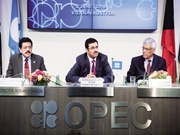OPEC decides to reduce output to 32.5 bpd

 0 Comment(s)
0 Comment(s) Print
Print E-mail CNTV, December 1, 2016
E-mail CNTV, December 1, 2016
The OPEC on Wednesday decided to cut its oil output by 1.2 million barrels per day, setting the ceiling of oil production at 32.5 million barrels per day (bpd).
The reduction is effective from Jan. 1, 2017, and is the cartel's first oil reduction since 2008. The reduction is being coordinated with the non-OPEC country Russia, which promised to cut its production by 300,000 bpd.
Qatar's energy minister Mohammed Al-Sada, president of OPEC, said the agreement was reached unanimously except for Indonesia, which has now suspended its membership of the cartel.
According to data offered by OPEC, the largest oil producer, Saudi Arabia took the biggest share of the reduction, 486,000 bpd, while Iran is allowed to produce 3.79 million bpd, a moderate number which seems to be consistent with its position of insisting to be exempted from the oil reduction, saying it needs to recover its oil production after the sanction relief.
Iraq, which claimed to be exempted from the reduction because of fighting extremists, also joined the reduction by cutting 210,000 bpd.
It seems that Saudi Arabia, the largest producer and de facto leader of the cartel made a compromise and took the largest hit with the reduction.
OPEC crude output rose to a record 33.83 million bpd in October, around one third of the world's oil production, according to the International Energy Agency (IEA), and output from the group's 14 members has climbed for five months running. In October, OPEC supply stood at nearly 1.3 million bpd above a year ago.
IEA believes that if OPEC countries implement their Algiers resolution, the resultant production cut will see the market move from surplus to deficit very quickly in 2017.
OPEC member states met in Algiers and the organization announced it would examine how to set up a production ceiling of between 32.5 million bpd and 33.0 million bpd.
The promised oil reduction from OPEC and non-OPEC producers would be over 1.5 million bpd.
It's not clear whether other non-OPEC producers besides Russia would be able to join the oil reduction.
OPEC's decision is followed by the jumping of the oil price on Wednesday, but analysts still doubt whether the cut could save the oil market. John Hall Fei, chairman of Alfa Energy said the reduction agreement could "save OPEC", but would bring the shale oil back, noting the U.S. shale oil companies were happy with this conclusion and would increase the rigs as soon as possible.






Go to Forum >>0 Comment(s)